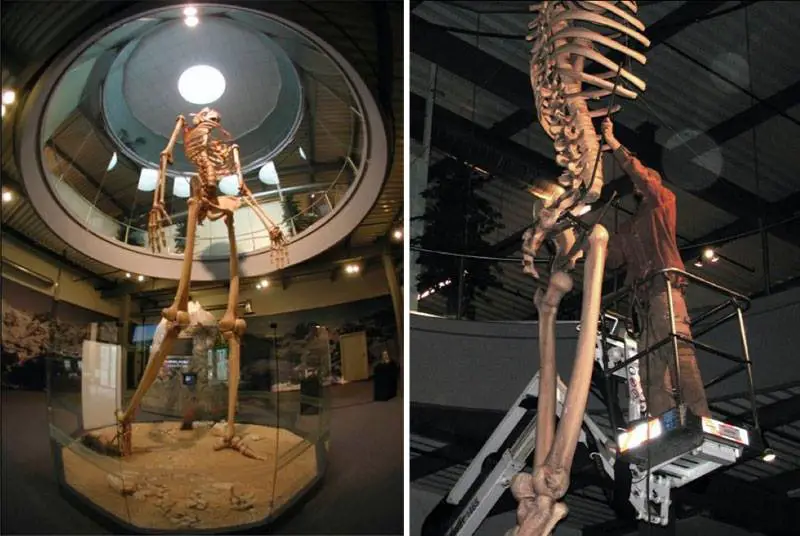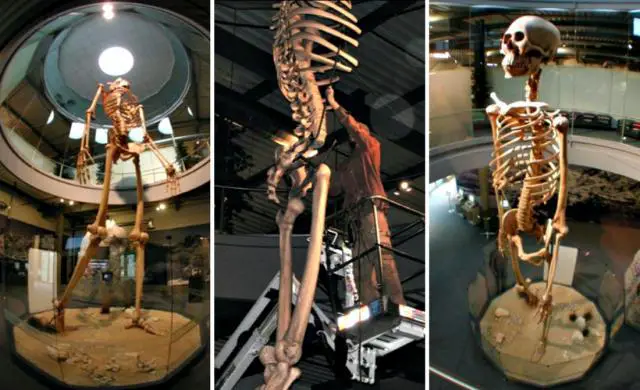Hidden History revealed: 7-meter-tall giant skeletons on display
Hidden History revealed: 7-meter-tall giant skeletons on display
By
Father Carlos Vaca—a Catholic priest— guarded for decades the remains of skeletons of immense size. Most of the bone fragments—of beings that had a height of around 7 meters—were recovered, from a site called “Changaiminas” in Ecuador. Curiously, Changaiminas translated means “Gods cemetery.”
There are countless stories of incredible discoveries that have been made around the planet. Curiously, Ecuador is home to many strange findings. One of the most popular recent discoveries is the so-called lost city of Giants which was found by a group of explorers in the Ecuadorian jungle.
In addition to the mysterious city, in the past people have found skeletons of immense size in different parts of Ecuador. In the southern parts of Ecuador, near the border with Peru, people have found all sorts of strange things. According to reports, experts have recovered bones and skeletons which are similar to humans only much larger in size.
Many of these skeletons and bones remained hidden from the public in private collections around the globe.
One of the most famous guardians of ‘Giant skeletons’ is believed to have been Father Carlos Miguel Vaca, who guarded until his death in 1999, several bones and fragments unearthed from a site called “Changaiminas” in Ecuador. Curiously, Changaiminas translated means “Gods cemetery.”
Father Carlos Miguel Vaca Alvarado was born on August 25, 191, in Loja, Ecuador. He was the priest of the parish of Changaimina in Gonzanamá Loja province in Ecuador.
Father Carlos Vaca was a Catholic priest, musician, and archaeologist who discovered in 1965—coincidentally the same year of Juan Moricz’s expedition in the Tayos cave and the discovery of an underground world—an archaeological settlement of GIANT skeletons which were later exhibited in his museum,located at Changaimina, known as the “Museo del Padre Vaca” where he kept numerous objects which were discovered in the lands owned by Mr. Luis Guamán.
The collection included bones of giants of supposedly seven meters in height that inhabited Ecuador and other parts of America thousands of years ago.
The collection was also composed of strange utensils, minerals, and compounds of “magical properties”, which according to many authors would explain numerous archaeological mysteries that have not yet been deciphered.
Some of the bone fragments were supposedly sent to the Smithsonian institute for further analysis. Reports of the skeletons and their whereabouts were broadcasted on a television program in Ecuador, led by renowned director Alfonso Espinosa De Los Monteros.
After the death of Father Vaca—curiously as it happened with the museum of Father Crespi—its contents were looted.
Please note, the images of the standing giant are the reconstruction of the fragments that were found in Ecuador in the 60’s and can be visited in the Mystery Park en Interlaken – Switzerland, since 2004.
Furthermore, in addition to the skeletons of immense proportions, researchers have discovered many more curious places in Ecuador. The Lost City of Giants is one of them.
According to an article on the website Earth4All written by Bruce Fenton, one of the discoverers:
In 2012 a group of Ecuadorian adventurers were led into the jungle to seek out the structure they had seen in an old photograph. On the first attempt they became lost, yet fate took a lucky turn, they actually stumbled on a second megalithic site, a strange stone platform situated on the edge of a small river. Scattered about on the jungle floor and in the water itself were a multitude of artefacts and human engineered stone objects. As yet these artefacts have not been matched to any known culture and even their previous functions remain a mystery for the most part. Soon after this the same group launched a second attempt for the megalithic wall in their photograph, this time successfully reaching the site.Thanks to our own efforts to make the public aware of this incredible discovery (or rediscovery even) images and video from the expedition and from others that followed have since sent shock waves through the global archaeological community. No expert has been able to offer an explanation for who might be responsible for this site nor when it could have been constructed. Quite simply it is not reasonable to think these sites were built in the dangerous interior of the Llanganates, rather it only makes sense to assume the structures were built at a time when the jungle was not present and have since been overgrown. The questions is then whether this might be centuries ago, or much more likely many millennia into our past!




Comments
Post a Comment